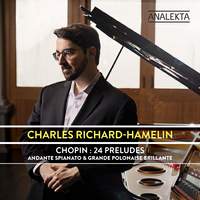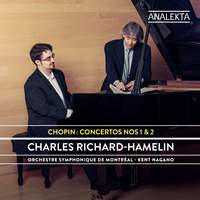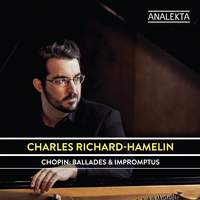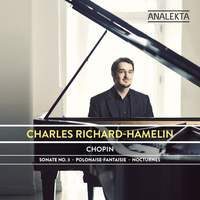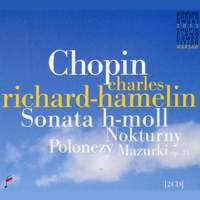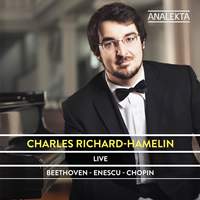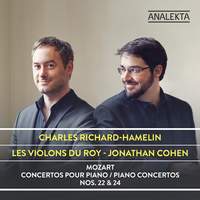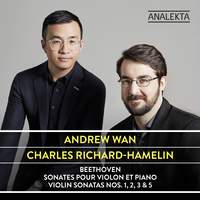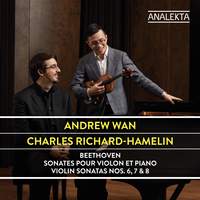Interview,
Charles Richard-Hamelin on Chopin
 Having followed the recording-career of Canadian pianist Charles Richard-Hamelin with much enjoyment since he took the silver medal at the 2015 International Chopin Piano Competition, I was looking forward to finally hearing him live at Wigmore Hall last summer, though alas the concert fell prey to lockdown restrictions. A lucid, compelling studio recording of the 24 Preludes Op. 28 (released on Analekta last month), though, provided ample consolation, and more than lives up to the high expectations set by his previous accounts of the concertos, nocturnes, ballades and impromptus on the same label.
Having followed the recording-career of Canadian pianist Charles Richard-Hamelin with much enjoyment since he took the silver medal at the 2015 International Chopin Piano Competition, I was looking forward to finally hearing him live at Wigmore Hall last summer, though alas the concert fell prey to lockdown restrictions. A lucid, compelling studio recording of the 24 Preludes Op. 28 (released on Analekta last month), though, provided ample consolation, and more than lives up to the high expectations set by his previous accounts of the concertos, nocturnes, ballades and impromptus on the same label.
It was a pleasure to make Charles's acquaintance via video-call last month to discuss his affinity with Chopin's music, the joys and challenges of playing it on historical instruments, and the artists who've inspired him in this repertoire since his childhood...
At what stage did you realise that Chopin was going to be such a major figure in your career?
It wasn’t really until the Chopin Competition! Paul Surdulescu, who was my teacher from the age of 5 to 18, assigned me the Nocturne in F minor as my first repertoire piece when I was about twelve; every year after that I worked on a Chopin piece, and every year it was my favourite. I was pretty late to the whole international competition game - it wasn’t until I moved back from Yale to Montreal when I was about 24 that I started to apply for things. After received top prizes in the Montreal and Seoul competitions, I had enough confidence to attempt the Chopin Competition in Warsaw. For many big competitions, I feel that you can bang your way to the top with fast, loud and clean playing; Chopin doesn’t allow for that, thankfully. It still felt like an unreachable goal in many ways, but I had at least a clear idea of how I wanted to play Chopin.
After my second prize at the Chopin Competition, I started to dig deeper into Chopin’s world – I was being invited to do a new programme every year, including tours in Japan. Playing and learning new works by Chopin feels like coming home to me. I’ve no Polish ancestry, but there’s something about the way his music fits under the hands: it feels like I’m not fighting against anything, whereas a lot of the Germanic music I love seems to have struggle built into it!
Who were your biggest inspirations in this repertoire?
Along with Martha Argerich, Krystian Zimerman was the biggest influence on me when I was young: growing up pre-internet without a huge number of recordings, his Ballades and Argerich’s Preludes were really my reference-points. I met him very briefly when the six prize-winners toured Japan with the Warsaw Philharmonic in January 2016 and he came to our Tokyo gala concert – thank god we didn’t know he was there beforehand, but it was such a great surprise when he showed up at the end! Argerich is another of these piano heroes that we all revere, and her playing never ceases to amaze me. She first recorded the Piano Sonata in B minor (the one I played for the Competition) fifty years ago, but I think her recent performance during the pandemic is the very best interpretation of this piece ever realised. To see someone musically, technically and emotionally at the top of their game at 79 is exceptionally inspiring – I dream of having such a long career!
We didn’t get to meet her at the Competition as she left right after the final; she didn’t award any first prize, but she did place me and Seong-Jin Cho together in second place so I guess I did something she liked! When she came to Montreal shortly afterwards I summoned up the courage to greet her backstage, and she said something that I’ll remember for the rest of my life: she casually mentioned that she'd been chatting to Radu Lupu, who’d been following the Competition, and he’d said very good things about me. Just knowing that two of my heroes actually had a conversation about me made me think ‘Well, I can retire happily now’! Lupu hasn’t played so much Chopin, but he’s also been such a role-model and inspiration – every time I’ve heard him play live it's been a life-changing experience.
In terms of contemporaries I have an enormous amount of respect for Eric Lu, whom I got to know through the Laureates’ Tour in Japan; we were together all the time for a month, and bonded musically on a lot of things. Eric used to come to Montreal a lot to play for Đặng Thái Sơn, and he’d always stop by and chat; I hope that one day we might get to do some four-hands piano music together… I also am a big fan of the young French pianist and composer Lucas Debargue.
And what about historical recordings?
When I give a masterclass, I often tell students to seek out old recordings of Josef Hofmann and Alfred Cortot and Ignaz Friedman – all the greats of the 1920s and 30s. And Rachmaninov playing Chopin is fascinating: there’s a great recording of the Second Sonata that’s very original, and he does some strange but interesting things with the Third Ballade! Pre-internet it was very difficult to get your hands on this stuff; YouTube is a great resource, if you know how to use it well.
How have you found that Chopin’s music is received in Japan?
I always wonder what Chopin would think if he knew that 200 years later his music would enjoy such resounding success in Asia! The pure beauty of it is universal, and I think that’s why people connect to it all over the world. There’s something about this music that speaks to the heart directly, but it’s also very satisfying on a more cerebral level – especially the late music which rewards multiple listenings, as opposed to early works like the concertos which give up most of their secrets on first hearing.
One of the things I treasure most about the Competition is that it opened me up to a whole new fan-base in Japan: the size of the audiences and their love for this music is unbelievable. I’ve had the pleasure of touring there six times, and it’s the only place in the world where I‘ve played Chopin in packed symphony halls to an audience of maybe 2000 people! In my hometown, a venue of that size would never be booked for a piano recital (unless for a major star like Lang Lang or Kissin) – you’re talking about 500 or 600 seats, perhaps for two nights.
How did the experience of recording the Preludes differ from performing them live?
Usually when I go into the studio I’ve performed the repertoire live many times, because my interpretation changes from playing them for different audiences, on different instruments and in different halls. (I must’ve played the Ballades and Impromptus at least fifty times before recording them!). The same thing was supposed to happen with the Preludes, but then the pandemic hit and I never got to play all 24 before recording, which was a new experience for me. But the other side of the coin was that I had all of this free time to dig deep, listening to recordings, really studying the score and playing for past teachers – it took me back to my student days. Since the Chopin Competition I’ve averaged seventy or eighty concerts a season: you have to learn quickly between programmes so sometimes you have to cut corners, and it’s not great when you go on stage and don’t feel supremely confident.
But with the Preludes, the music demands it: it’s so difficult for many different reasons, not least because it’s such a short form that you have to convey exactly what you want to do from the very first note. When I went into the studio I didn’t do all 24 in a row: I really focused on them one by one. Since the recording, Montreal and Quebec have started opening up and I’ve had the chance to play them eight times. It’s very different in concert, because there’s no looking back and you have to plan carefully the pacing between each Prelude.
And some of the Preludes are very technically demanding: take No. 16, which is marked presto con fuoco and comes right after eight or nine minutes of mostly slow playing…Suddenly you have to jump into the tempest, and having your fingers ready is a challenge in a live performance whereas in the studio you can anchor yourself by playing it a few times in a row to get in the groove! Performing them live is a very intense, exhausting experience altogether – the set is about forty minutes long, and by the time you reach the end you feel like you’ve been through so much, like one epic story but told in 24 chapters.
What do you make of Cortot and von Bulow’s titles for the Preludes?
Some of Cortot’s have not aged well: I think my favourite has to be his title for No. 17, ‘and she told me “I love you” ’!. I’ve never loved the ‘Raindrop’ tag for No. 15 either; Cortot titles it ‘And death is never very far’, which is a bit much but makes more sense to me. The middle section in C sharp minor is very dark; you can see where he’s coming from. The whole idea of labelling attract instrumental music is very limiting. I’m reminded here of Mendelssohn’s objection to his friend coming up with titles for his Songs without Words. Music is so open to interpretation and at its best conveys emotion and meaning beyond words. I think it’s a bit reductive to come up with arbitrary titles.
Do you have any preferences regarding pianos when it comes to Chopin?
I’ve never played an historical instrument in concert yet, but I’ve enjoyed exploring them, particularly Pleyels. Erards and Broadwoods don’t speak to me so much, but with Pleyels - especially the ones in good shape from the 1840s - you really do feel where a lot of Chopin’s compositional choices came from. And you don’t have to work as hard: I have relatively small fingers, and these pianos make certain things a lot easier because the keys are narrower. It’s barely noticeable, but you do feel it when you span a tenth! The registers also have individual personalities, and everything somehow plays itself more naturally. But the dynamic range and especially the cantabile sound of those instruments are a little less satisfying – you have to be expressive in different ways, with more emphasis on timing, articulation and rubato.
Regarding modern pianos, the instrument I played in the Competition was a beautiful Yamaha CFX, which was extraordinary – those are my favourite pianos in the world, but ones on that level are quite rare. The best Yamaha CFXs that I’ve played in Japan and Europe are, to me, as good or better than the best Steinways from Germany for playing Chopin: they have a lightness that reminds me of Pleyels, although they aren’t always as well suited for big concertos because they often don’t project as much. But no piano is ideal for everything - in a perfect world you’d have different instruments for different composers. My home piano is a 1911 Steinway A model, beautifully refurbished – I love pianos with past lives!
What’s next for you – both on stage and in the studio?
I’m in the process of editing my third and final CD of the Complete Beethoven Violin Sonatas with Andrew Wan, the concert-master of the Montreal Symphony Orchestra. This one will feature Nos. 4, 9 and 10 and should be out in the fall. We’re a bit late to the party as the Beethoven Year has passed, but lately everyone’s schedule has been a mess for obvious reasons….
I can’t say too much else, but I love to branch out in different directions – as with the Enescu Suite on my second CD. I think perhaps I get this curiosity from my namesake Marc-André, who’s truly one of a kind! We aren’t related, but we write to each other from time to time. I’d love to take a lesson with him, but I know teaching isn’t something he does much: he has such supernatural ability that I don’t think he can relate it to us mere mortals! I discovered a lot of composers through him – Kapustin, Medtner, Feinberg…
Hopefully, I will get to do more concerto recordings - I did some Mozart with Jonathan Cohen, who’s much loved in Quebec City for his work with Les Violons du Roy. In his three years as Artistic Director he’s only spent a year and a half here because of the pandemic, but thankfully his contract has been renewed. Two events that were cancelled due to the pandemic were especially dear to my heart: my Japanese tour of the Preludes (now postponed until December 2022), and my Wigmore Hall debut which was scheduled for July 2020 – hopefully it will still happen someday !
Charles Richard-Hamelin (piano)
Available Formats: CD, MP3, FLAC, Hi-Res FLAC, Hi-Res+ FLAC
Charles Richard-Hamelin (piano), Orchestre Symphonique de Montréal, Kent Nagano
Available Formats: CD, MP3, FLAC, Hi-Res FLAC
Charles Richard-Hamelin (piano)
Available Formats: CD, MP3, FLAC, Hi-Res FLAC, Hi-Res+ FLAC
Charles Richard-Hamelin (piano)
Available Formats: CD, MP3, FLAC, Hi-Res FLAC, Hi-Res+ FLAC
Charles Richard-Hamelin (piano)
Available Formats: MP3, FLAC
Charles Richard-Hamelin (piano)
Available Formats: CD, MP3, FLAC, Hi-Res FLAC, Hi-Res+ FLAC
Charles Richard-Hamelin (piano), Les Violons du Roy, Jonathan Cohen
Available Formats: CD, MP3, FLAC, Hi-Res FLAC, Hi-Res+ FLAC
Andrew Wan (violin), Charles Richard-Hamelin (piano)
Available Formats: CD, MP3, FLAC, Hi-Res FLAC, Hi-Res+ FLAC
Andrew Wan (violin), Charles Richard-Hamelin (piano)
Available Formats: CD, MP3, FLAC, Hi-Res FLAC, Hi-Res+ FLAC


